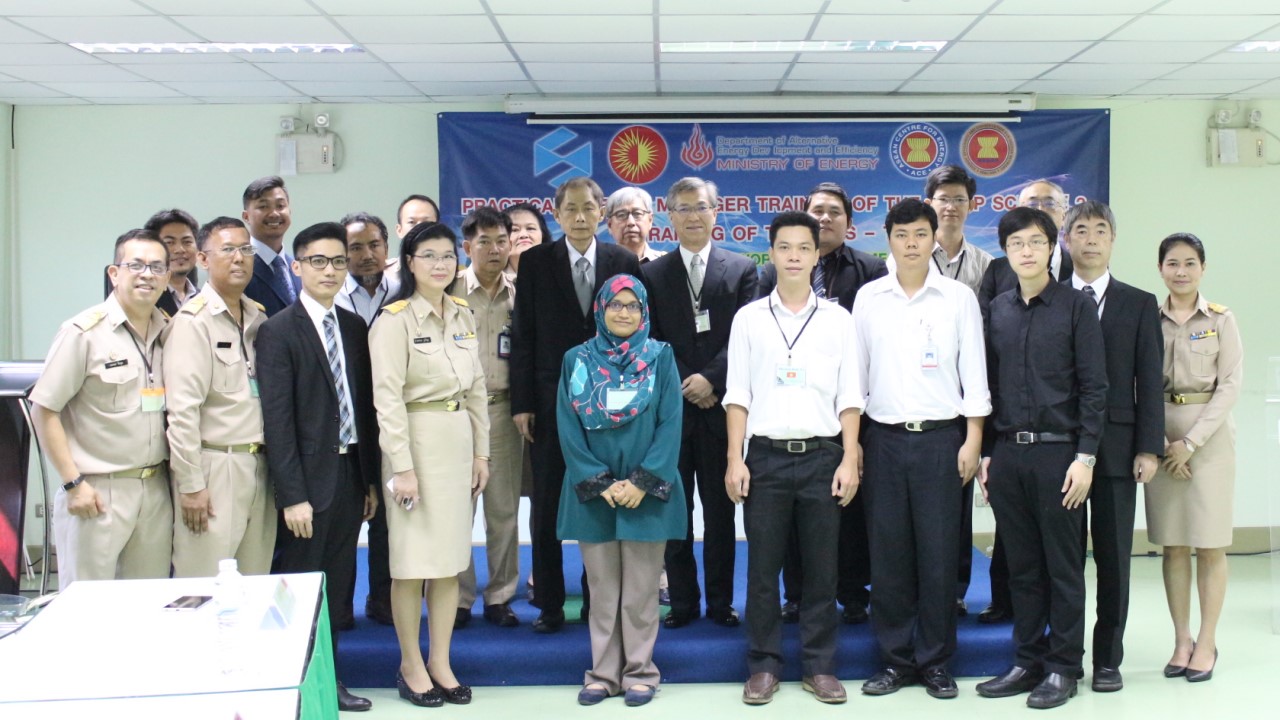Menu

The ASEAN-Japan Energy Efficiency Partnership Scheme 2 on “Practical Energy Manager Training (Training of Trainers)” under the Senior Officials Meeting on Energy – Ministry of Economy, Trade and Industry (SOME-METI) Work Programme 2016-2017 was held on 14-18 November 2016 at the Practical Energy Manager Training Centre in Pathum Thani, Thailand. The Training was jointly organised by the ASEAN Centre for Energy (ACE) and Energy Conservation Center, Japan (ECCJ) in cooperation with the Department of Alternative Energy Development and Efficiency (DEDE), Thailand. For this year’s programme, the scheme was focused on the refinement of the training and accreditation system for energy managers in Indonesia, Malaysia, Thailand and Vietnam. A total of 8 (eight) trainees from the four Member States had been successfully trained during this month’s training.

Addressing the challenges of environment due to the region’s economic growth, a vigorous energy efficiency and conservation (EE&C) regulatory framework is required. To ensure its translation into appropriate energy efficiency initiatives and implementation that support the goal set in ASEAN Plan of Action for Energy Cooperation (APAEC) 2016-2025 (energy intensity reduction target by 20% in 2020 based on 2005 level), strengthening national and regional cooperation on EE&C is therefore essential. The AMS need to improve energy management system as well as the competence of energy managers as keys to successful energy management through training and certification. Those key messages were highlighted by Mr. Danai Engkamol, Deputy Director General, DEDE, Thailand, Mr. Takashi Kanazawa, Manager of International Division, ECCJ and Mr. Rio Jon Piter Silitonga from ACE during the opening session.
Based on the feedbacks received from the trainees, the 5-day training course was very useful in advancing the understanding of all participants on energy conservation measures through energy audit technique using mini plant facilities and portable measurement equipment of the training centre. The combination of simulation-mini-plant and practical training provided an in-depth, comprehensive learning and problem-solving practices that serve to prepare trainees for trial energy audit and certification under the SOME-METI programme. The five-day training covered: i) Energy Audit Practice using Mini-Plant Equipment and Portable Instruments; ii) Pump & fan; ii) Compressed Air System; iii) Furnace and Open Burner; iv) Boiler & Steam Trap; v) Lighting; vi) Air Conditioning & Chiller; and vi) Various Technology and EE&C Techniques for building, industrial and residential.
On the last day of the training, the future work plan and preparatory steps were discussed to ensure the accomplishment of the programme as scheduled. There are two (2) upcoming activities to be conducted, namely: trial energy audit in respective Member States and Energy Conservation Workshop under AJEEP (ECAP) 11 Workshop. Through the energy audit, it was expected that all participants are able to demonstrate their acquired skills and knowledge in diagnosing the energy performance and to come up with a comprehensive report including analysis and recommendations for energy conservation improvement in building and industry sector. The report will be presented at the ECAP 11 Workshop which will be held in February 2017, Tokyo, Japan. (RJPS. Featured photo credit: DEDE Thailand)
